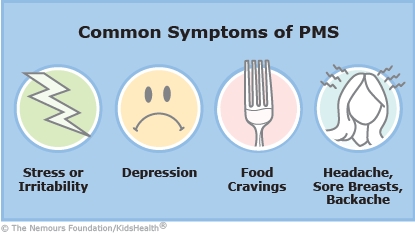Premenstrual Syndrome: How to Care for Your Child
Premenstrual syndrome (PMS) is when changes in a girl's body and mood happen in the 5–10 days before or at the start of her period, then go away completely after the period begins. Sometimes these symptoms can interfere with school, work, and/or relationships. Lifestyle changes such as being active, eating well, getting enough sleep, and managing stress can help some women. If needed, medicine can be prescribed.


-
Make sure your daughter takes any medicines prescribed by the health care provider.
-
Help your daughter track her periods, moods, and body changes on a calendar or smartphone app. Knowing when to expect PMS symptoms can make it easier to deal with them.
-
Encourage your daughter to make healthy lifestyle choices. It can help her to:
-
Eat a healthy diet with plenty of whole grains, lean meats, fruits, and vegetables.
-
Avoid high-salt foods, caffeine, and refined carbohydrates.
-
Get enough rest.
-
Be physically active.
-
Manage stress; for example, through yoga, relaxation exercises, and meditation.

Your daughter:
-
doesn't feel better after following the health care provider's recommendations
-
has symptoms of PMS that don't go away when she gets her period
-
seems very sad or hopeless
-
seems like she might hurt herself

What causes PMS? Experts don't know the exact cause of PMS. But it's probably linked to hormone changes in the body, which lead to chemical changes in the brain. Girls with PMS often have family members who also have it.
What are the symptoms of PMS? Common symptoms include a feeling of fullness (bloating) in the belly, acne, tiredness, sore breasts, headaches, backaches, diarrhea, constipation, food cravings, sadness, irritability, trouble concentrating, difficulty handling stress, and feelings of anxiety.
What medicines are used to treat PMS? If a girl's PMS is severe, health care providers may prescribe birth control pills (to balance hormones) or medicines that treat depression.